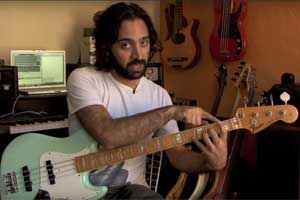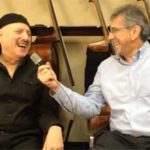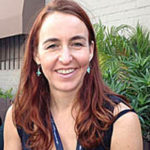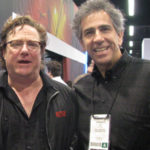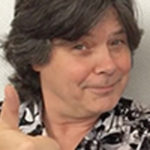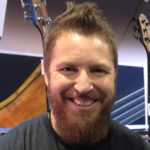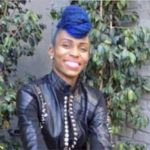Longtime Bass Player editor talks candidly with FBPO about life before, during and after the magazine
Jonathan Herrera is the former Senior Editor of Bass Player magazine. He has performed and/or recorded with Cyrus Chestnut, Oz Noy, Atma Anur, Will Kennedy, Alex Acuna, Jerry Goodman, Derek Sherinian, Zigaboo Modeliste, Steve Turre, Kai Eckhardt, Jon Fishman, Russ Ferrante and many others.
FBPO: Tell me about your musical upbringing.
JH: I was about 5 when I took my first piano lessons. My mother, a way-too-humble classical pianist herself, definitely pushed me a bit to make use of the piano that was forever in my childhood house. There was a lot of music in my house, too, although it was a limited to a motley assortment of show tunes (my mom) and late ’60s/early ’70s singer-songwriters (my dad). I particularly remember my mom listening to Oklahoma or The Sound of Music while she vacuumed and my father’s Simon & Garfunkel records on my way to soccer practice.
I took to piano. I liked the direct connection between physical motion and sound, and I think there was something of the instrument’s mechanical intricacy that satisfied my machine-obsessed young and curious mind. I began taking lessons from an extraordinary pianist in L.A., Edith Knox, who had previously played at an ultra-high level (L.A. Phil, etc.). She was ancient, narcoleptic and a little surly, but she had a picture of her and freakin’ Liszt on her wall above her two 100-year-old Steinway concert grands, so she definitely seemed credible.
I lost interest in piano practice when I was about 11 or 12, aroune the time I discovered rock & roll. My best friend got a guitar for Christmas. Realizing that with a bass we’d constitute 2/3 of an epic power trio, I got a bass for my January birthday. Thus began the obsession I’m still struggling to manage effectively.
FBPO: Who were your musical influences when you were growing up?
JH: My parents, primarily. They weren’t big music fans with broad musical spheres, but they did seem to appreciate quality. I heard a lot of fantastic music when I was young — a lot of classical music, especially “the three Bs,” and wonderful singer/songwriters, like James Taylor, Paul Simon, Bob Dylan, Joni Mitchell and many more. If anything, these influences injected an appreciation for melody and lyricism into my subconscious.
Growing up in Los Angeles, I was a prime age for a good time in rock and I was lucky to go to some epic shows early on. Edgy bands with brains were most appealing: Jane’s Addiction, Faith No More, early RHCP. I was also way into the grunge thing — Pearl Jam, Nirvana, Soundgarden, etc.
I do think my early experience with show tunes and Bach, especially, gave my head a hunger for harmony. I liked the concepts of chords moving through ephemeral periods of tension and release and the art of supporting lyrical and melodic themes through harmonic movement. Even during my early days of rock discovery, jazz began to catch my ear. I wasn’t sure what to make of it, but something within it resonated with an already established openness in my mind.
FBPO: Tell me a little more about your becoming a bass player.
JH: The most obvious catalyst was my best friend and earliest musical companion getting a guitar. Getting a bass seemed liked the next obvious move. I do think, however, that there was something about the bass that appealed to me, subconsciously. It suits me. As I’ve become older and come to know our community so well, I do see the clear connection between the instrument and the personalities of its practitioners. We tend to be reflective, modest and more excited by subtlety and nuance than guitarists. Yet, in spite of this, we’re also quietly pleased by the power we know we wield in a band. I’d argue that it’s the most powerful chair in a band. A simple root change can completely disorient the prevailing tonality of a moment in music. Plus, we like to groove. I like to groove. The undeniable primal force of a good groove speaks to me.
FBPO: What kind of gigs were you doing initially?
JH: My earliest gigs were in my local Catholic church, where I also went to school from 2nd through 8th grade. I joined the band around 6th grade, playing bass and occasionally piano. Being in L.A., the band was actually pretty happening. The two MDs while I was there all had impressive professional careers going. I remember one of them had just been on the road with Paul Simon on the Graceland tour when he joined. I was doing the best thing I knew to become better: playing with people who were better than me. It taught me a lot about performance, reading charts, being sensitive, following cues, etc. It was an early lesson in musicianship and there was little room to lose sight of these priorities by showing off. And, lest I be tempted, I was just way too intimidated by these much older players. Soon after, I was in some rock bands, playing typical garage stuff, and did more playing throughout high school for church, musicals, and more. By the end of high school, I was definitely the most musical kid in school, doing arrangements, playing rehearsal piano, leading bands, etc.
College was where it got serious. I went to USC and studied a ton of music. The gigs got better. After ’SC, I went to the Los Angeles Music Academy, where I met and became friends with great players, like Jerry Watts, Ed Lucie and Hussain Jiffry. Better gigs came and went. I went on some big auditions in L.A., but was more than a little burnt out on the freeways, smog and general difficulty of L.A. That’s when I moved to San Francisco, where I’ve been blessed with some great gigs, including Oz Noy, Stanley Jordan, Zigaboo Modeliste, Steve Turre, Garaj Mahal and Miguel Migs, plus a bunch of sessions, too.
FBPO: How did you land the job at Bass Player?
JH: I heard of the BP opportunity almost simultaneously from a friend at the company and an ad on Craigslist. The job sounded too good to be true. Basically, it sought a player who was gear savvy and could write. I definitely felt I had both qualifications. I went in for an interview and hung out with the staff. I also did a little playing. Eventually, it happened. It was an extraordinary blessing, a lucky confluence of time and talent, I think.
FBPO: Your tenure at the magazine was pretty long. Are there any myths or misconceptions you’d like to clear up about what goes on at Bass Player magazine? Do you think people have an accurate perception of what BP is really all about?
JH: Bass Player has a truly broad and diverse audience that’s basically impossible to neatly categorize and identify. We share one thing in common: the bass. Otherwise, the audience is constituted of players of all ages into every form of music imaginable. Actually, I’ll add one more categorical similarity in BP’s audience: they’re mostly male. Over 90%, in fact.
There are as many myths and misconceptions about BP as there are people in this big and unruly audience. From my perspective, a lot of it has to do with lumping BP in with wider trends in the media and culture. For some, everything seems corrupt and hollow. They look at the veracity of TV or the newspaper and think, God, everything out there is somehow trying to put one over on me. These people assume our content is shaped by our advertisers’ whims and that our product reviews are unfair and biased toward those who support the magazine financially. Many people also assume BP only writes about the same 10-15 players and that it’s insufficiently adventurous in concept and content.
Over time, as an editor, you learn from these perceptions. You also learn to ignore them. I’ll say this: the staff really does love the instrument and is as skeptical as the next guy or girl as to our vulnerability of inappropriate or unethical influence from the outside. There’s a lot of insulation between editors/writers and the ad sales staff. In fact, the editors really have no idea what ads are going to appear in an issue until they get the hard copy themselves.
There’s also a lot of ignorance out there as to just how difficult it is to make a magazine of BP’s scale. The overhead is enormous. There does seem to be an impression among some that if an issue is short, it’s somehow our choice. Like it’d be just as easy for us to press a button and add thirty pages to an issue! The folks don’t realize that these choices are completely out of our hands. If anything, they ought to call the manufacturers who advertise — or don’t. It’s the revenue the company makes from them that is by far the largest determinant of the heft of a given issue.
All that said, the magazine has room for improvement. Times are tough. It’s hard to get it out each month, especially with new demands from management about our online efforts. In essence, there aren’t enough people there to pull it all off, and overall this harms the magazine.
FBPO: What made you decide to leave the magazine?
JH: This is a very complicated question. In essence, I needed to move on. I’ve always wanted to play. It’s all that’s ever really mattered to me. For years, working at BP seemed to support this goal, but as time wore on, it seemed to be at odds with it. Something within me grew tired of writing about people doing the thing I most wanted to do.
Honestly — and why not just be honest — the magazine is poorly managed at the very top. There’s a serious disconnection between our management in New York and the folks at BP, Guitar Player and the other music magazines in the group. It’s a sad and familiar story, but management’s expectations exceed reality. Plus, NewBay Media’s management in New York — and I very explicitly mean just the NY management — is just not hip to the music thing. We editors and yes, even the ad sales folks, love music and understand the culture. The people who make the big decisions for us don’t. That got discouraging and demoralizing and, coupled with my strong desire to venture out and play, enough was enough.
It’s sad, really. I love Bass Player. I read it voraciously when I was a little kid. Becoming editor exceeded my wildest expectations. It’s excellent, in spite of its challenges. Brian Fox, my replacement, and the rest of the staff are unbelievably capable, but it’s too bad such challenges exist. They shouldn’t. They’re harming the magazine.
FBPO: How have you been keeping busy since you left?
JH: Mostly, I’ve been doing a ton of playing and rediscovering the joys of practicing for its own sake. I’ve also designed my own website. I did a tour with Stanley Jordan and a lot of local gigs with an incredible Bay Area guitarist, Matthew Charles Heulitt. I just wrapped up a record with the drummer Brain. I’m working on a new smart rock project with Rick Musallam, the guitar player from Mike Keneally and Bryan Beller’s band, in addition to doing singer/songwriter sessions, house music overdubs, teaching… I’ve just doing the bass player’s hustle. I’ve been working on making some deals with manufacturers, too, and endorsements from Fodera, DR and Reunion Blues. Basically, I’m trying to become a civilian again.
FBPO: What lies on the horizon for you now? What can we look forward to seeing and hearing from Jonathan Herrera in the future?
JH: Continued playing and teaching. At BP, I learned so much about what seems to speak and work for bass players that are trying to better themselves and now that I don’t have the magazine channeling my energy so substantially, I want to continue to satisfy my desire to share. I’ve had offers to do other bass-oriented things in print, but that doesn’t seem to be where my head is right now. I’m open to suggestions and I love to help. I mostly want to be a musician that offers as much of himself as he can to any situation.
FBPO: What would be if you weren’t a bass player?
JH: A piano player with a heavy left hand.
